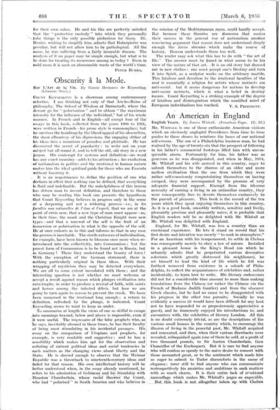Obscurity a la Mode.
Bur L'Art de la Vie. By Comte Hermann de Keyeerling. (Librairie Stock.) COUNT KEYSERLING is a showman among conternporary eclectics. I am thinking not only of that Aix-les-Rains of philosophy, The School of Wisdom at Darmstadt, where the devout go for polarisation " and to obtain " the maximum intensity for the influence of the individual," but of his whole. manner. In French and in English—all except four of the' essays in this, book, collected from the years 1906 to 1921, were written in French—his prose style is commonplace,' but he survives the handicap by the bland appeal of his obscurities, the slicer effrontery of his digressions, the engaging slither of his ideas into a mountain of paradox and platitude. He has discovered the secret of popularity : to write not on your subject but all round it, and to tell the old, old story in a: new ' jargon. His contempt for systems and definition—no word: has any exact meaning—adds to his attraction ; his exaltation. ' of nationalism in polities and the irrational in human nature makes him the ideal spiritual guide for those who are Fascists: without knowing it.
It is an impertinence to define the position of one who declares in effect that nothing can be defined, that everything Is fluid and indefinable. But the unhelpfulness of this truism': has driven man to invent definition, and therefore to those who may be reading this book one presents the hypothesis _ that Count Keyserling believes in progress only in the sense: of a deepening and not a widening process—i.e., in ks; families non ralionelles de r dine el l'espril, that we are at the point of crisis now, that a new type of man must appear—as, in their time, the monk and the Christian Knight were new types—and that a renewal of the self is the fruit of an ; immersion or polarisation in what is the opposite of the self. He at once exhorts us to this and informs us that in any case the process is inevitable. The sterile extremes of individualism, for example, have been known to blossom once more when re- introduced into the collectivity, into Communism ; but the ;
purest form of Communism is to be found not in Russia, but in Germany ! There they understand the beauty of force I
With the exception of the German statement, there is nothing particularly original in these ideas. With their wrapping of mysticism they may be detected everywhere. We arc all to some extent inoculated with them ; and the interesting question is not whether we must welcome or . accept a revolt against reason which plunges civilisation into . catastrophe, in order to produce a revival of faith, with saints' and heroes among the infected debris, but how we are going to turn again to reason to prevent the crash. We have ; been immersed in the irrational long enough ; a return to 'definition, refreshed by the plunge, is indicated. .Count ; _ Keyserling seems to want to keep us under.
To summarise at length the views of one so skilful in escape into meanings beyond, below and above is impossible, even if it were useful. The impresario of the false prophets who, as. 'he says, inevitably abound in these times, he has their faculty! of being most stimulating in his incidental passages. His essay on the comparison of Utopians and prophets, for example, is very readable and suggestive ; and he has a sensibility which makes him apt for the observation and collating of current political ideas and social tendencies in!
• such matters as the changing views about liberty and the State. He is shrewd enough to observe that the Weimar
• Republic was a throwback to nineteenth-century ideas and failed for that reason. His own intellectual history will be better understood when, in the essay already mentioned,: he refers to his admiration of Gobineau and his friendship with Houston'thiniberlain, whose racial iheciiieS' the Count, who had " polarised " in South America and who belieires the mission of the Mediternmean _rages, could. hardly .accept. But because - these theories are - douteirses that makes their success in the general rise of nationalism another convincing argument that reason does not understand deeply enough' the forges oliscures which make the course. of history. Reason understands them too well.
The reader may ask what this has to do with " the art of life." The answer must: be found in what seems to be his
view of the nature of that art. is an old story but dreased out in new clothes : one must accept one's Destiny and, turn it into Spirit, as a sculptor, works on the arbitrary marble. This fatalism and devotion to' the irrational faculties of soul is essentially s religion for artists whose instincts are anti-social : but it seems dangerous for nations to deVelop anti-social instincts, which is what a belief in destiny means. Count Keyserling is a striking example of the degree of fatalism and disintegration which the muddled mind of
European individualism has reached.
V. S. PRITCHETT.
















































 Previous page
Previous page